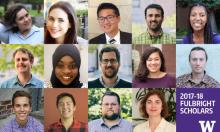Of the 11 University of Washington students to receive the Fulbright Scholarship in 2017-2018, two come from the Department of Asian Languages & Literature. Benjamin Lee (’15, Chinese) and Christopher Diamond (current graduate student in South Asian Languages & Literature) both received the prestigious award to pursue research projects overseas.
Administered by the Bureau of Educational and Cultural Affairs at the Department of State, the Fulbright Scholarship provides resources for students to pursue graduate study, advanced research, and teaching opportunities abroad. Benjamin and Christopher will join roughly 1,900 students across the United States as 2017-2018 Fublright Scholars.
Benjamin Lee will embark in August on a four-month language training in Beijing, and then travel to Nanjing for another ten months of research. In Nanjing, he will be conducting research on how the Taiwanese business community facilitated cross-Strait relations from 1987 to 1992. He is particularly interested in how the business community became the conduit for communication, promoted economic integration, and mediated political reconciliation across the Taiwan Strait from 1987 - 1992. As part of his research, he will be interviewing Taiwanese businessmen who have worked in mainland China since the late 1980s.
Christopher Diamond will be performing research for his doctoral dissertation research on the 14th/15th century poet Vidyāpati. A court poet in his time, his legacy has reached far beyond his home in Mithilā (a region of the North Indian state of Bihar and part of Nepal) into neighboring regions and vernacular languages. In each of these areas, he is thought of as having radically different intentions, religious affiliations, and linguistic affinities. Christopher will track down manuscript and performance traditions of the early modern period to figure out how these divergent trajectories formed and competed with each other and to investigate what this can tell us about the formation of more recent religious and language-based identities in North & East India as expressed through literary traditions.
